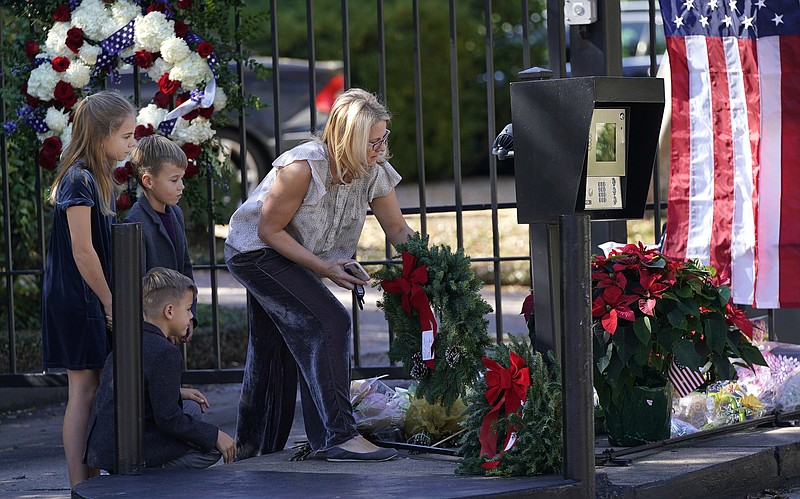George H.W. Bush, who died at the age of 94 late Friday, may have been the last of his kind.
The nation's 41st president - who became affectionately known by that number once his son, George W., became the 43rd president - was not only a military veteran and hero, but he was a statesman and one of the most experienced men ever to occupy the White House. Beyond that, he had a kindness, grace and innate sense of himself that has been lacking in the men who have occupied the office since he left it.
Bush was a son of privilege but a self-made man, a man educated at Yale but tempered by the hard-scrabble people of West Texas, a chief executive whose leadership helped bring an end to the Cold War but eschewed any kind of victory lap, a leader who presided over a shooting war but refused to seek a wider win, a president who knew sky-high approval but was turned out of office following a mild economic downturn, an individual who could boast of much but doggedly would not do so.
So steeled in the admonition of his mother, Dorothy, not to brag but to think of others, he refused to pen an autobiography like most recent presidents. His name appeared over the typical pablum presidential candidate book "Looking Forward" in 1988, a book, "A World Transformed," on his foreign policy co-written with Brent Scowcroft in 1998, and a book of letters, "All the Best, George Bush," in 2013.
His legacy, Bush often said, is for historians to decide.
Nearly 28 years after he left office, the presidency has felt, at times in recent years, like amateur hour. No president since has been tempered by battle, served in Cabinet-level positions or had foreign policy experience before becoming president.
Bush's extensive resume, besides building his own business in West Texas, has included being a congressman, United Nations ambassador, chairman of the Republican National Committee (in the wake of Richard Nixon's resignation from the presidency), director of the CIA (when the agency was at a low ebb after being hounded by congressional investigations), special envoy to China (the nation's first after Nixon's strategic visit there several years earlier) and two-term vice president of the United States under Ronald Reagan before becoming president.
In each of those positions, his circle widened, so that when he called a world leader, the world leader not only knew him but knew what to expect of him.
That type of leadership is what allowed Bush to cobble together a coalition of nations to oppose Iraq, which had seized control of Kuwait, in the 1991 Gulf War. When his son, George W., tried to do the same for action in Afghanistan and Iraq following the Sept. 11, 2001, terrorist attacks on the U.S., he wasn't as successful.
He also sent troops to Panama to oust dictator Manuel Noriega and bring him to the U.S. to stand trial on drug-trafficking charges, signed the landmark Americans with Disabilities Act, signed the first improvements to the Clean Air Act in more than a decade and, significantly, called on Americans to volunteer and become "a thousand points of light" (which lives on as an independent, nonpartisan, nonprofit organization to encourage and empower the spirit of service).
One of our favorite stories about Bush concerns his affirmative vote on the 1968 Fair Housing Act, a stalled bill that was pushed through Congress a week after the assassination of civil rights leader Dr. Martin Luther King Jr. in 1968.
Bush's mail had been running "500 to 2, I'd guess," against the bill in his conservative Houston congressional district, he said, but a year earlier he had paid his way to visit U.S. troops in Vietnam and seen "young black soldiers fight for love of their country while affluent white kids ran away or got deferred."
In spite of the opposition in his district, in spite of what he believe were constitutional issues about the bill, he felt blacks should have the same rights to housing as whites and voted for its passage. Later, faced with a group of angry constituents, he nevertheless gave an impassioned defense of his vote and received a standing ovation.
But the vote, many observers have said, cost Bush the election two years later when he sought an open U.S. Senate seat in the state.
It was a true profile in courage for a man whose life as a Navy pilot, as a man attempting to get into the risky oil business and as the father of a dying daughter already had seen such examples.
Although we admired Bush as a statesman and president, it is his character that reverberates. We think, for instance, of his desire not to celebrate the fall of the Berlin Wall in 1989 (in order not to embarrass Soviet leader Mikhail Gorbachev), his willingness to sign a tax hike in 1990 (which broke his "no new taxes" pledge but led to the improving economy present when he lost re-election), of the many former White House workers who have said he and wife Barbara were the most gracious residents they'd served and of his intentional friendship with fellow former president Bill Clinton (whose impeachment had left a bad taste in people's mouths).
It is somehow fitting, then, that the last words George H.W. Bush uttered in his Houston home Friday were love for another, as related by his former secretary of state and longtime friend, James Baker, who was in the room.
"I love you, too" he said in response to his oldest child, George W., who was talking to him over speaker phone from Dallas and had told he loved him and he'd been a "wonderful dad."
